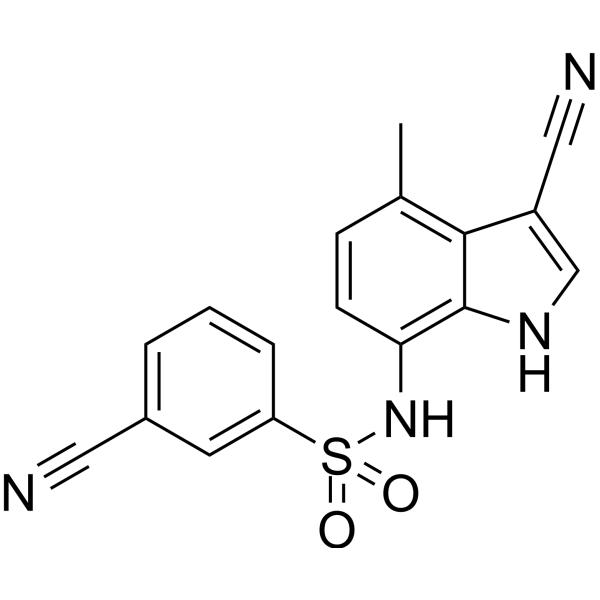| Cas No.: | 289483-69-8 |
| Chemical Name: | 3-Cyano-N-(3-cyano-4-methyl-1H-indol-7-yl)benzenesulfonamide |
| Synonyms: | Benzenesulfonamide,3-cyano-N-(3-cyano-4-methyl-1H-indol-7-yl)-;E 7820;E-7820;AC1L52N5;ER68203-00;KB-76741;NSC719239;NSC-719239;SureCN1581157;E7820;3-cyano-N-(3-cyano-4-methyl-1H-indol-7-yl)benzenesulfonamide;TVH5K7949N;N-(3-cyano-4-methyl-1H-indol-7-yl)-3-cyanobenzene-sulfonamide;N-(3-cyano-4-methyl-1H-indol-7-yl)-3-cyanobenzenesulfonamide;Benzenesulfonamide, 3-cyano-N-(3-cyano-4-methyl-1H-indol-7-yl)-;3-cyano-N-(3-cyano-4-methyl-1H-indol-7-yl)benzene-1-sulfonamide;O6M;3-Cyano-N-(3-cyano-4-methyl-1H-indole-7-yl)benzensulfonamide;3-Cyan-N-(3-cyan-4-methyl-1H-indol-7-yl)benzolsulfonamid;3-Cyano-N-(3-cyano-4-méthyl-1H-indol-7-yl)benzènesulfonamide;3-cyano-N-(3-cyano-4-methyl-1H-indol-7-yl)-benzenesulfonamide;Boc-Met-OSu;BS-16799;http:////www.amadischem.com/proen/581203/ |
| SMILES: | O=S(=O)(NC1C2NC=C(C#N)C=2C(C)=CC=1)C1C=C(C#N)C=CC=1 |
| Formula: | C17H12N4O2S |
| M.Wt: | 336.367781639099 |
| Purity: | >98% |
| Sotrage: | 2 years -20°C Powder, 2 weeks 4°C in DMSO, 6 months -80°C in DMSO |
| Description: | E7820 is an angiogenesis inhibitor by suppressing integrin a2, a cell adhesion molecule expressed on endothelial cells. |
| In Vivo: | E7820 (50 mg/kg) with erlotinib has a significantly synergistic antitumor effect in three xenograft models without severe body weight loss. E7820 (50 mg/kg) and erlotinib decrease MVD and enhance apoptosis in tumor-associated endothelial cells, inhibit tumor cell proliferation and enhanced apoptosis, and enhance inhibition of cell proliferation and apoptosis through activation of both intrinsic and extrinsic apoptosis pathways in human NSCLC xenograft models[1]. E7820 shows anti-tumor activity at doses of 50, 100, and 200 mg/kg in the tumor growth and α2-integrin expression experiments[2]. E7820 (50, 100, and 200 mg/kg) inhibits tumor growth in a dose-dependent manner in all s.c. xenograft models. E7820 completely inhibits s.c. tumor growth of LoVo tumor cells and also regresses the tumor mass of KP-1 tumor cells at the dosages of both 100 and 200 mg/kg[3]. |
| In Vitro: | E7820 treatment inhibits proliferation of HUVEC induced by either bFGF and VEGF in serum-free medium with IC50 values of 0.10 and 0.081 μg/mL, respectively. E7820 also inhibits both bFGF- and VEGF-driven tube formation of HUVEC in this assay. The IC50 values are 0.20 and 0.24 μg/mL, respectively[3]. |
| Cell Assay: | Tumor cells are plated at 1 to 2×105 cells/well on 96-well plates in 0.1 mL of RPMI 1640 containing 10% fetal bovine serum. After 24 h, either E7820 or vehicle is added to duplicate cultures of cells, and at 2 or 3 days after addition of E7820, the ratios of surviving cells are measured by the 3-(4,5-dimethylthiazol-2-yl)-2,5-diphenyltetrazolium bromide assay. All experiments are done at least in duplicate and repeated twice. |
| Animal Administration: | A549, H1975, and H1650 cells are s.c. inoculated into 9-week-old female nude mice. Approximately 10 days after inoculation, E7820 (25 and 50 mg/kg) is given orally twice daily and erlotinib (60 mg/kg) is given orally once a day for 3 weeks. Tumor volume (TV) and relative TV (RTV) are calculated by using a formula described previously. The combination effect on RTV is analyzed by using two-way anova. |
| References: | [1]. Ito K, et al. Enhanced anti-angiogenic effect of E7820 in combination with erlotinib in epidermal growth factor receptor-tyrosine kinase inhibitor-resistant non-small-cell lung cancer xenograft models. Cancer Sci. 2014 Aug;105(8):1023-31. [2]. Keizer RJ, et al. Evaluation of α2-integrin expression as a biomarker for tumor growth inhibition for the investigational integrin inhibitor E7820 in preclinical and clinical studies. AAPS J. 2011 Jun;13(2):230-9. [3]. Semba T, et al. An angiogenesis inhibitor E7820 shows broad-spectrum tumor growth inhibition in a xenograft model: possible value of integrin alpha2 on platelets as a biological marker. Clin Cancer Res. 2004 Feb 15;10(4):1430-8. |

 To enhance service speed and avoid tariff delays, we've opened a US warehouse. All US orders ship directly from our US facility.
To enhance service speed and avoid tariff delays, we've opened a US warehouse. All US orders ship directly from our US facility.




















